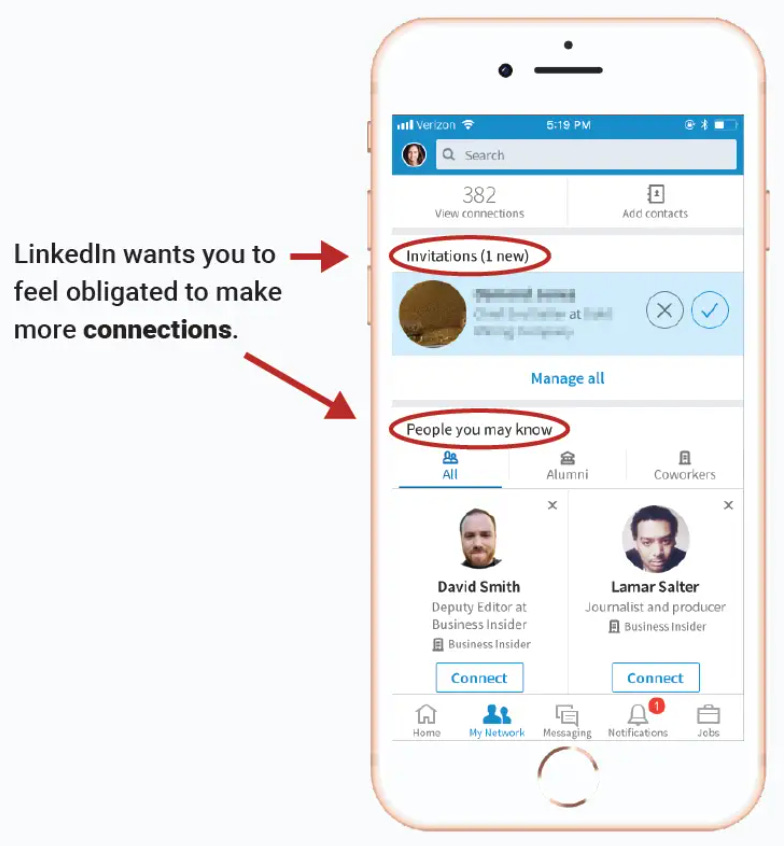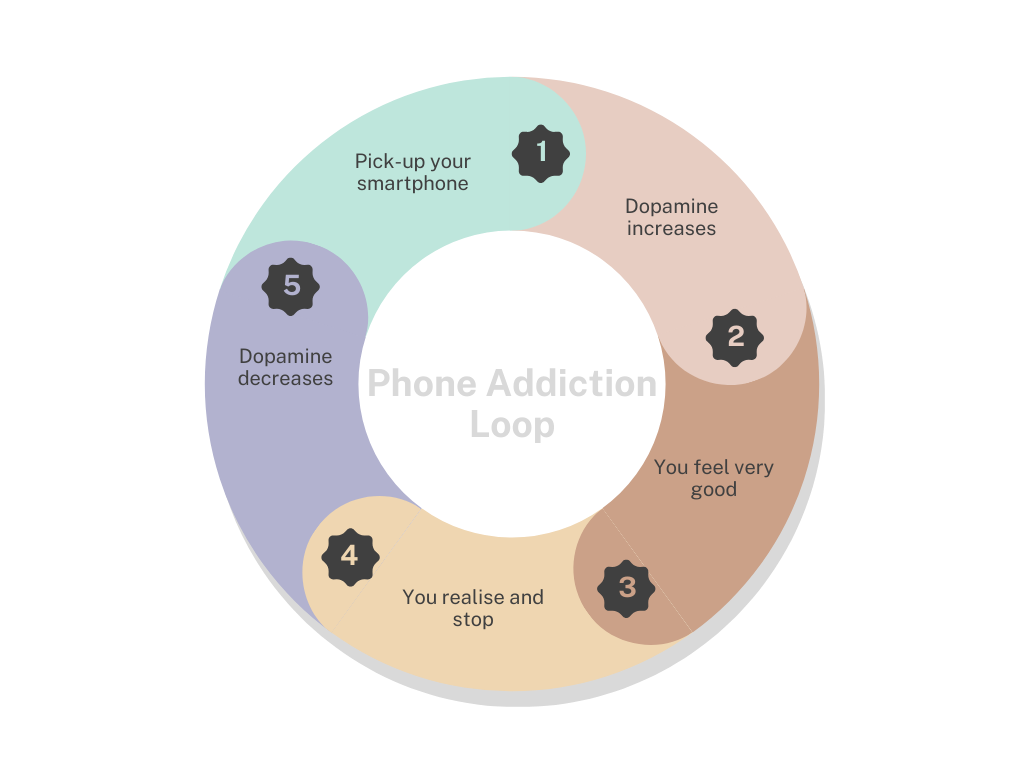Lost in Connection or How we Spend 1/3 of our Days Looking at Screens
6 hours and 58 minutes. That's the daily time an average person spends on screens, of which 2 hours are lost in irrelevant things. Why does this happen? What does the science say? Can we avoid it?
We all agree on he fact that technology has brought to our lives wonderful things, such as being connected to our beloved ones, being able to shop in a matter of minutes, being able to book hotels from the other side of the world … However, and especially social media, have brought also new ways of addiction.
The Facts
On average, a person spends 7 hours staring at screens every single day, of which 2 are lost in irrelevance activities. Who has not been staring at Instagram for 45 minutes without even realizing? Who has not been lost in the YouTube loophole watching dumb videos for 1 hour? If that happens once every 4 months, maybe that is not a problem, however, it is a problem when that happens on a daily basis without realizing.
Beyond the fact of losing every single day 2 hours, there are some more relevant consequences of being dependent from technology in such a way:
Switch Focus
I don’t want to say lose focus, as I don’t believe we lose it, I believe we switch it. Where we were able to complete a rutinary task in 45 mins, it now takes us 1:15h to get the same task done. The reason is we lose many time when doing anything. If the task is finishing a report, maybe you it can take you 30 more mins, even though it will end up being a great amount of time by the end of the year, however, the problem comes when this focus is switched between relationships and social media.
Less Productive
Another consequence of losing focus is being less productive. Same example as before, more time is needed to complete tasks, especially the repetitive, boring or time-consuming ones, as our dopamine systems (We will see this more in-depth), don’t feel the tasks as instantly rewarding as scrolling TikTok, Instagram or YouTube.
Personal Relationships are Affected
I am sure you have been with a friend grabbing lunch, and he has been staring at his phone for 10 minutes without talking, while you were thinking if you should even be tolerating that attitude. Well, bad news, you have been that friend more than once, I bet.
Undoubtedly that affects relationships, makes us lose our spark with our beloved ones and makes us stay apart rather than getting closer.
How do smartphones contribute to social distancing?
Smartphones and apps are masterly designed. They are designed in a way in which they can catch anyone for long hours.
Notification tags
Algorithms
Instant Rewards
Infinite Scrolling
Autoplay
Gamification
These are just a few techniques used by app developers and OS developers to keep their users constantly dependent on their phones and apps.
Nice, but how do they do it more precisely?
Well, many of the techniques were not even invented by developers. Think when you use an app that allows you to refresh and get more news, posts … Many of the times you refresh nothing new appears, however, some other times, something new appears. It is totally random, so your brain feels engaged to refresh, as there is a “reward” waiting for you just around the corner.
Due to our nature, humans are always looking forward to engage with other people, make connections and establish our networks. LinkedIn is an example of this, it is a social network, and as the name says, it uses networks to make people connect. One of their focuses is to make you feel engaged and part of a community. It is really difficult that you go to your “People you may know” tab and not know at least one person after scrolling 2 minutes.
Another good example is Tinder, they are masters at making finding your love a game. Swipe as many times as you want, infinite scroll used in another way, but the same underlying technique. If you are trying to find your soulmate on Tinder, you literally have endless options, good news for you!
But, going inside our minds, who do all these things keep us so engaged?
Dopamine is the answer. Every time we get one of this little rewards, our body secretes Dopamine, and even if you don’t know this, you love it, and it makes you addict, you feel somehow pleasure. It is a very similar process as with drugs, your brain identifies this as something great, and you keep doing it.
Then, is technology good or bad for us?
Well, as everything, it has some nuances, and most likely there’s no right answer, it all depends on the use you give to technology.
It has been shown that we have advance our lives in a very significant way in the last 10-15 years in a way which we couldn’t even think about 25 years back, however, all this has came together with some other not so good “advancements”.
For those who spend 3 hours a day on Instagram scrolling and watching shorts, may be a waste of time, however, for those who spend 3 hours a day on Instagram producing quality and relevant content and building businesses based on that content, may not be a waste of time. Same tools, same time, but all depends on what you use the tools for.
Can I avoid being addicted to technology?
Good news! You can!
First of all, spending 1 hour a day on Insta or YouTube may not be making you an addict, you could maybe spend in a better way that time, however, you are likely not an addict.
You should start getting worried if the time you spend on Social Media is bigger than the time you spend physically interacting with other humans or doing activities not related to technology.
What triggers your dependence?
We all know what we use more from our phones. The camera, X, Instagram, YouTube … From that point, try to identify why you open and spend so much time on those apps.
Are you feeling lonely? Are you feeling depressed? Are you feeling anxious? Most likely the trigger for these feeling have nothing to do with technology, but is in technology where you find a relief.
Try and find alternatives, such as Mindfulness, Relaxation, Practice Sports …
Learn how to write
Of course we all know how to write, however, I mean proper writing, or at least try to be able to put in order your ideas and structure them. This will help you enormously see the broader picture and be able to take better decisions.
Build a support network
Whether this is your mom, your couple, your son or your aunt, try and talk to someone you know is able to listen to you, someone who is able to ask you questions, Why? How? When? Who? In this way, you will be able to bring out of your mind all your worries and put them in context together with your support partner.
Digital Minimalism
This is a great way to leverage technology to your advantage. More and more people are becoming digital minimalists, which does not mean to have a 2005 Nokia and live disconnected in the middle of the countryside (Which wouldn’t be a bad idea though). It means, with the available technology, use it to your advantage, limit your interactions with algorithm-based apps, such as Instagram, Twitter, LinkedIn … I’ll leave a very nice video I liked about this topic, which shows some very interesting apps in order to make your smartphone less appealing so it is easier for you to disconnect.
Reysu’s Video on How to Turn Your Smartphone into a Dumbphone.
To sum-up, there’s nothing such bad or good technology, it is just a matter of how we use it. First of all, if you feel too dependent on technology, try first to speak to someone in your inner circle, if that does not give you enough perspective, it might be worth to check with an expert in the field, they see these cases very often and will provide you with the right stack to solve this.
Even on YouTube or on Google you will be able to find a bunch of interesting techniques and tools to minimise your presence on Social Media, and reduce the time you spend on them. I am sure your beloved ones, your mind and your body will be very pleased!






